March 25, 2021
Caregivers for family living with dementia need support: survey

The pandemic continues to test our resolve, posing restrictions on who we can see, what we can do, and where we can go. For family caregivers to people living with dementia at home, in long-term care or supportive living facilities, the pandemic has not only isolated them, but the critical care resources and social support systems they rely on have also been cut or dramatically reconfigured.
Dr. Gwen McGhan, PhD, Faculty of Nursing, and Dr. Deirdre McCaughey, PhD, Cumming School of Medicine (CSM), with support from the CSM’s W21C Research and Innovation Centre, conducted a survey during lockdown. More than 200 Calgary area residents look after people living with dementia. Results of the pilot study highlight the burden of COVID-19 policies on caregivers and their inability to support their loved ones.
“Being a family caregiver is an unpaid and often unsupported role, but an essential role, nonetheless,” says McGhan, who is a registered nurse and principal investigator of the study. “Family caregivers provide physical, emotional and financial support to a parent, spouse, neighbour or friend, and help them with essential everyday tasks they may not be able complete by themselves.”
Family caregivers Sheena Bates and Daniel Gaetano have partnered with University of Calgary researchers to generate awareness of these challenges and provide policy recommendations for future emergency planning.

Sheena Bates is a full-time family caregiver at home for her husband, Paul, who lives with dementia.
Supplied photo
The role of a caregiver is complex. “You always have to be on the ball, you are responsible,” says Bates, who is a family caregiver for her husband, Paul. “You need to still respect their independence as much as you can. I keep reading and trying to learn more to help us and other people in the same position. It can be tough.”
Bates has been providing full-time care for Paul at home since 2017, currently assisting him with tasks such as dressing, showering, shaving and toileting. Before the pandemic, Paul attended adult day programs, and together they would participate in conversation cafes and other meetings for family caregivers and their partners. They also received a few hours of respite care each week. COVID-19 halted all these supports.
“Paul’s needs increased, at least partly because of no social contact, and that all falls on you,” says Bates. “We couldn’t see other family members or friends for some months; it was very isolating.”

Daniel Gaetano is a full-time caregiver for his wife, Janet. Janet is living with dementia and resides in a long-term care facility.
Supplied photo
Daniel Gaetano has been a full-time family caregiver for his wife, Janet, since 2015, who is now in a long-term care facility. Before the pandemic, Gaetano would visit twice a day to support her at mealtimes, provide connection, and to keep her walking. With the lockdown he was unable to access the facility to provide care for Janet.
“All of a sudden you have this big void. You are her caregiver; this is who you are, and this is what you do,” says Gaetano. “When that was taken away, you can’t really start anything else. You just have to wait until you can become her caregiver again.”
The initial study funded by the Alzheimer Society of Calgary provided policy recommendations related to maintaining tailored caregiving supports and resources; providing clear, correct, and concise information on public health protocols; and allowing family caregivers continued access to care recipients as they provide an essential role. UCalgary researchers are now looking to expand upon their initial recommendations by including experiences of family caregivers from across Alberta. You can share your experience during COVID-19 in the survey.
“As an unpaid caregiver, fatigue and anxiety is still happening,” says Gaetano. “The pandemic has highlighted these issues for unpaid caregivers.”
Partners and supporters of this research include the Alzheimer Society of Calgary, Dementia Network Calgary, Alzheimer Society of Alberta and Northwest Territories, the Drummond Foundation, and Alberta SPOR Support Unit.
Gwen McGhan is a registered nurse and an assistant professor in the Faculty of Nursing.
Deirdre McCaughey is an associate professor in the Department of Community Health Sciences, and a member of the O’Brien Institute for Public Health at the CSM.





